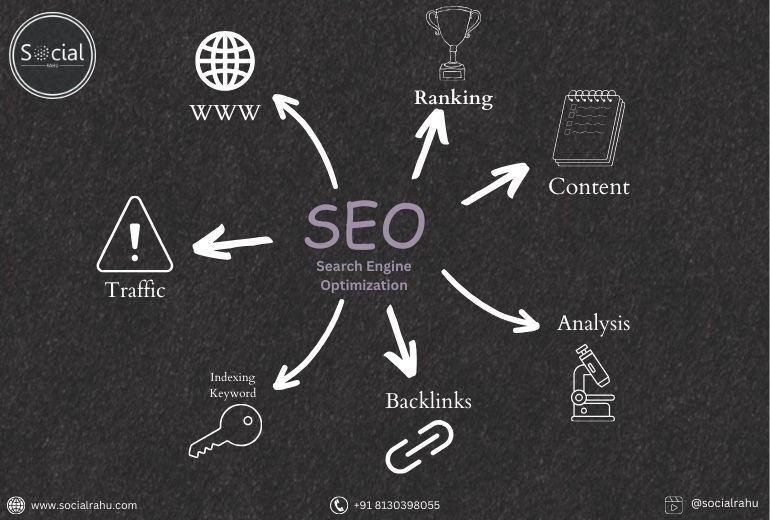What Is Seo?
SEO, or Search Engine Optimization, is the practice of improving a website's visibility and ranking on search engine results pages (SERPs) in order to attract organic (non-paid) traffic. The goal of SEO is to optimize various elements of a website—such as content, keywords, meta tags, site structure, and backlinks—to make it more relevant and authoritative in the eyes of search engines like Google, Bing, and Yahoo.
The primary objective of SEO is to ensure that a website appears as high as possible in search engine results when users search for relevant keywords or phrases related to the website's content or offerings. Higher rankings increase the likelihood of users clicking on the website's link, leading to increased traffic and potential conversions.
SEO involves both on-page and off-page optimization techniques:
1. On-Page SEO: This involves optimizing individual web pages to improve their search engine rankings and attract more relevant traffic. On-page SEO techniques include optimizing content with relevant keywords, improving meta tags (title tags, meta descriptions), optimizing headings (H1, H2, H3), improving site structure and navigation, optimizing images, and ensuring mobile-friendliness and page speed.
2. Off-Page SEO: This refers to activities conducted outside of the website to improve its search engine rankings and authority. Off-page SEO primarily involves building high-quality backlinks from other reputable websites, as well as social media engagement, online reputation management, influencer outreach, and brand mentions.
SEO is an ongoing process that requires continuous monitoring, analysis, and adjustment to keep up with changes in search engine algorithms, user behaviour, and industry trends. Effective SEO strategies not only improve a website's visibility and traffic but also contribute to enhancing user experience, credibility, and overall online presence.
- The Power of SEO: SEO is more than just a buzzword; it's a game-changer for businesses looking to thrive in the digital landscape. By optimizing your website's content, structure, and authority, you can significantly improve your visibility on search engines like Google, Bing, and Yahoo. Here's how SEO empowers your digital marketing efforts:
Enhanced Visibility: With SEO,
your website is more likely to appear at the top of search engine results
pages (SERPs) for relevant queries, increasing exposure to potential
customers actively searching for products or services like yours.
Targeted
Traffic: By optimizing for specific keywords and phrases relevant to your
business, you attract highly qualified leads who are more likely to
convert into customers or clients.
Credibility
and Authority: Appearing prominently in search results instills trust and
credibility in your brand, positioning you as an authority in your
industry or niche.
Cost-Effectiveness:
Unlike paid advertising, which requires ongoing investment, SEO
delivers long-term results with relatively minimal ongoing costs, making
it a cost-effective strategy for sustainable growth.
- Data-Driven Insights: SEO tools provide valuable data and insights into user behaviour, search trends, and competitor analysis, empowering you to make informed decisions and continuously optimize your strategy for better results
- Incorporating SEO into Your Digital Marketing Strategy: To leverage the full power of SEO, it's essential to integrate it seamlessly into your overall digital marketing strategy. Here are some key steps to get started:
- Keyword Research: Identify relevant keywords and phrases that align with your business objectives and target audience's search intent. Use tools like Google Keyword Planner, SEMrush, or Ahrefs to discover high-value keywords with achievable rankings.
- On-Page Optimization: Optimize your website's content, meta tags, headings, and images to make them more search engine-friendly. Ensure your content is informative, engaging, and optimized for both users and search engines.
- Technical SEO: Address technical aspects of your website, such as site speed, mobile-friendliness, crawlability, and indexability, to improve user experience and search engine accessibility.
- Content Marketing: Create high-quality, relevant content that addresses your audience's needs, pain points, and interests. Incorporate targeted keywords naturally into your content to improve visibility and relevance.






